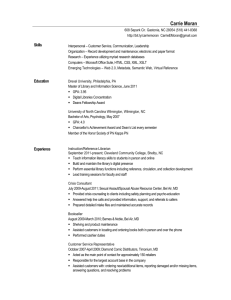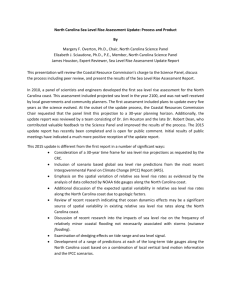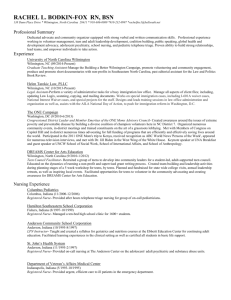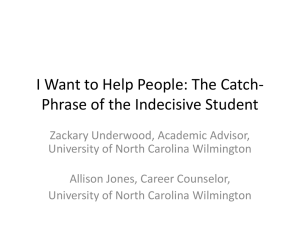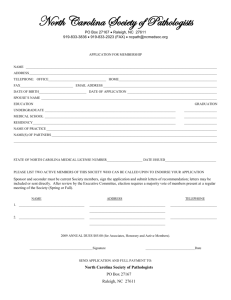Save Target As - Carolinas Communication Association
advertisement
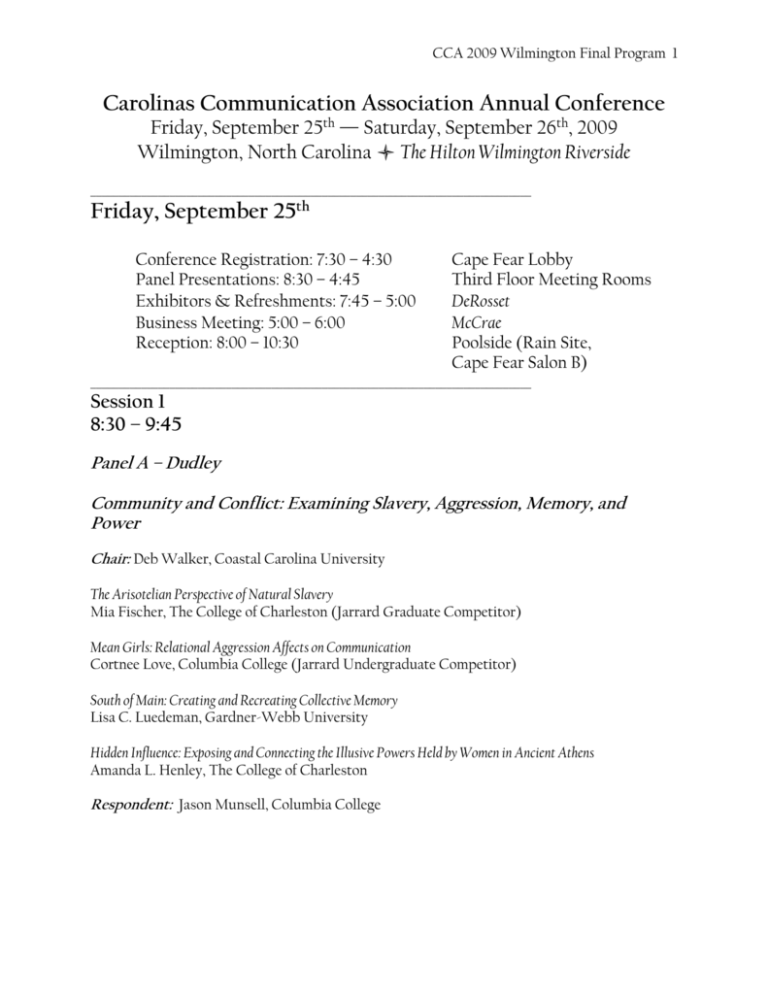
CCA 2009 Wilmington Final Program 1 Carolinas Communication Association Annual Conference Friday, September 25th — Saturday, September 26th, 2009 Wilmington, North Carolina The Hilton Wilmington Riverside ______________________________________________________________________________ Friday, September 25th Conference Registration: 7:30 – 4:30 Panel Presentations: 8:30 – 4:45 Exhibitors & Refreshments: 7:45 – 5:00 Business Meeting: 5:00 – 6:00 Reception: 8:00 – 10:30 Cape Fear Lobby Third Floor Meeting Rooms DeRosset McCrae Poolside (Rain Site, Cape Fear Salon B) ______________________________________________________________________________ Session 1 8:30 – 9:45 Panel A – Dudley Community and Conflict: Examining Slavery, Aggression, Memory, and Power Chair: Deb Walker, Coastal Carolina University The Arisotelian Perspective of Natural Slavery Mia Fischer, The College of Charleston (Jarrard Graduate Competitor) Mean Girls: Relational Aggression Affects on Communication Cortnee Love, Columbia College (Jarrard Undergraduate Competitor) South of Main: Creating and Recreating Collective Memory Lisa C. Luedeman, Gardner-Webb University Hidden Influence: Exposing and Connecting the Illusive Powers Held by Women in Ancient Athens Amanda L. Henley, The College of Charleston Respondent: Jason Munsell, Columbia College CCA 2009 Wilmington Final Program 2 Panel B – Latimer Ethnic Notions: Racial Images in the Media and Their Impact on Community This panel of undergraduate students will examine the racial stereotypes and portrayals of minorities in the media, specifically in newspapers, television, and film. Discussions will center around the impact of these images on local communities and college campuses and will identify opportunities for dialogue regarding cultural communication. Focus will be on the depiction of people of color including African Americans, Hispanics and Asian Americans and the research is designed to introduce the audience to some of the complexities of the relationships between race, culture, popular culture and mass media. Chair: Frances Ward-Johnson, Elon University Analyzing Racial Images in Local and National Newspapers Jessica Foust and Alex Trice, Elon University The Current State of Minority Images on the Silver Screen Nneka L. Enurah, Elon University Television Sitcoms: Comparing and Contrasting Images of Minority Families and European American Families in Weekly Shows Lamar Lee, Elon University The Battle of Images in Films from African American Directors Tyler Perry, John Singleton, and Spike Lee Keadrick Peters, Elon University Respondent: David Bollinger, University of North Carolina Wilmington Panel C – McCrae Fostering Community through Service Learning: An Undergraduate Perspective Chair: Richard K. Olsen, University of North Carolina Wilmington This panel examines service learning experiences from the participants’ perspective – in this case, undergraduate students in advanced public relations and introductory integrated marketing communication (IMC) courses. Working from an agency model, the undergraduate panelists provided research, strategic planning, and measurement services for three clients: a K-8 Wilmington area charter school, the Osher Lifelong Learning Institute at UNCW, and UNCW’s Marketing and Communications Department. The participants will discuss the benefits of working through a praxis (theory-informed action) framework and will also address the CCA 2009 Wilmington Final Program 3 challenges and opportunities these projects presented. By explaining the semester-long process and ultimate project outcomes (including formal client presentations), the panelists hope to engage in honest reflection on their experience and provide a constructive approach for future service learning projects. Audience participants are encouraged to ask questions and contribute their own experiences (triumphs and challenges) in client-driven service learning projects. Allyson Corbin, Stephanie Saulsbury, and Lyndsay Smith, University of North Carolina Wilmington ______________________________________________________________________________ Session 2 10:00 – 11:15 Panel A – Dudley What the Tech? Blogs, short for weblogs, offer a number of opportunities and challenges for communication pedagogy. In communication and media courses, blogs are being used to foster discussion outside of the classroom setting, enhance student reflection on course topics, catalog reading synopses in an interactive way, and empower students to create and publish their own work. Blogs provide interactive two-way commenting features and offer simple form-driven technologies that can ideally facilitate collaborative learning, build community outside of the classroom environment, and make students active producers of knowledge. Still, integrating blogs into a communication curriculum offers a variety of challenges for teachers. What are some productive and creative uses for faculty and student blogs? How do you set up a class blog? What kind of training should you provide students? How do you monitor and administer your blog site? How do you evaluate student work on a blog? What do you do to protect students who publish on the web? This panel includes both college professors and instructional technologists who have used blogs across a variety of communication and media courses to publish journalism stories, enhance learning outcomes, advance media criticism, and discuss foundational course concepts. In this hands-on session, panelists will showcase blogs that they have developed for their courses and will address how blogs can be used to meet particular pedagogical goals, discuss the problems they encountered, and offer strategies for developing blog assignments and evaluating student work. This panel will also offer tips for avoiding some of the technological and pedagogical pitfalls of teaching with blogs. As an interactive, roundtable format, this panel hopes to inspire an ongoing conversation with other teachers who have either considered using blogs in their classes and/or who have successfully integrated blogs into their curriculum. Chair: Stephen Daniel, Virginia Tech Panel Participants: Mendi Benigni, Instructional Technologist, College of Charleston CCA 2009 Wilmington Final Program 4 Vincent Benigni, Department of Communication, College of Charleston Janis Chakars, English Department, University of North Carolina Wilmington Leigh Moscowitz, Department of Communication, College of Charleston Kristen Seas, English Department, University of North Carolina Wilmington Panel B – Latimer Learning through the Doing: Collaboration and Community Building in Grassroots Organizations Chair: Patricia Comeaux, University of North Carolina Wilmington Kimberly Bicknell, Betty Houbion, Tiffany Kasarjian, Ashley Logan, and Deborah Walker, Coastal Carolina University and the East Carolina Coalition against Human Trafficking (ECCAHT) Panel C – McCrae Great Ideas for Teaching Speech (G.I.F.T.S.) Chair: Cathey Ross, Central Piedmont Community College Fostering Community to Reduce Communication Apprehension in an Introductory Public Speaking Course Jim Coon, Wingate University Using Blackboard to Efficiently Collect and Share Student Narrative Speech Evaluations Donata Nelson, Rockingham Community College Helping Our Students to Value Putting their Speeches to Memory while Reinforcing the Need for Clear Organization Kimberly M. Cuny, University of North Carolina Greensboro Inclusion of New and Social Media in the Teaching of Journalism and Communication Guy Reel and Larry Timbs, Winthrop University Roman Rhetoric, the Stasis System, and Fried Chicken (All the While Fostering Community!) Jason Munsell, Columbia College ______________________________________________________________________________ CCA 2009 Wilmington Final Program 5 Session 3 11:30 – 12:45 Panel A – Dudley “ . . . I Don’t Think We’re in North Carolina Anymore”: Perspectives on Teaching, Presenting, and Conducting Research Communication in Foreign Lands Chair: David Bollinger, University of North Carolina Wilmington It’s a Long Way from NCA: Presenting Research to a European Audience in a Foreign Land David Weber, University of North Carolina Wilmington Dichos, Chorizos, y Perros Callajeros: A Brief Ethnographic Introduction to the Cultures of Chile and Argentina Stephen Pullum, University of North Carolina Wilmington Challenging British Students to Examine the American Civil Rights Movement from a Communication/Rhetorical Perspective Patricia Comeaux, University of North Carolina Wilmington Perspectives on Teaching Vietnamese Managers Communication Skills over a Ten-Year Period Bruce C. McKinney, University or North Carolina Wilmington Panel B – Latimer The Rhetoric of Barack Obama Chair: Brooke Wyatt, University of North Carolina Wilmington Barack Obama Introduces Himself to the Nation: The 2004 Keynote Address to the Democratic Convention Lloyd Rohler, University of North Carolina Wilmington President Barack Obama and the Rhetoric of Contemporaneity John Patton, Wingate College Black, White and In-Between: How Barack Obama Rewrote the Politics of Racial Identity Susan Ladd, UNC-Greensboro (Jarrard Graduate Student Competitor) Getting Students Involved in Politics: Creating a Non-partisan Internet Resource in a Situated Learning Course Jennifer Brubaker, University of North Carolina Wilmington CCA 2009 Wilmington Final Program 6 Panel C – McCrae Development and Implementation of Undergraduate Research: Faculty Roundtable of Best Practices Chair: Steve Madden Panelists: Roy Schwartzman, University of North Carolina Greensboro Jenifer Kopfman, College of Charleston Kim Nguyen, Salem College Kelli Fellows, University of North Carolina Wilmington Steve Madden, Coastal Carolina University Anita McDaniel, University of North Carolina Wilmington ______________________________________________________________________________ 12:45 – 2:00 Lunch Break ______________________________________________________________________________ Session 4 2:00 – 3:15 Panel A – Dudley Engaging and Critiquing Public Communicative Acts on Social Equality This panel features undergraduate student papers that investigate the effects of public communicative acts that attempt to encourage social equality. Each paper considers, analyzes, and evaluates the written, oral, and visual aspects that shape the effectiveness of each text to achieve the goals of social equality. Chair: Kim Nguyen, Salem College A Rhetoric of Disinterest: How On-Air Sports News Talk Makes Women’s Sports Disappear Brittanie Hardy, Salem College (Jarrard Undergraduate Competitor) This Does Not Exist: A Look at William Cooper’s Behold a Pale Horse Through the Words of William Brown’s RSI Model Savannah Collier, Salem College CCA 2009 Wilmington Final Program 7 PETA’s Anti-Fur Campaign as an Intervention Molly Markey, Salem College People Magazine’s Representation of Motherhood Emmy Jadoff, Salem College The Representation of Domestic Violence between Chris Brown and Rihanna in the Media: Mock Feminism at its Best Misti Miller, Salem College Respondent: Carol Dykers, Salem College Panel B – Latimer Crafting Communal and Personal Identity: North Carolina Holocaust Survivor Resettlement Testimonies The AfterWords Project, with support from the North Carolina Council on the Holocaust, gathers and examines firsthand accounts of an under-researched aspect of the Holocaust: the ongoing saga of how survivors rebuilt their identities after their persecution. This panel of undergraduate AfterWords researchers profiles the major intellectual dimensions and pedagogical products arising from the project. The presentation includes a mini-documentary of a forced labor camp survivor and samples of the pedagogical materials designed to reframe communication about the Holocaust as stories that transcend victimage. Chair: Roy Schwartzman, University of North Carolina Greensboro Repairing the Rifts in Holocaust Education Fawn Cannon, University of North Carolina Greensboro Survivor Testimonies and the Argumentative Roots of Holocaust Denial Chloe Gonzalez, University of North Carolina Greensboro Identity Construction in Holocaust Survivor Narratives Lindsey Fox, University of North Carolina Greensboro Navigating the Dialectical Tensions of Holocaust Survivor Resettlement Stories Melinda Alston and Bethany Barnes, University of North Carolina Greensboro CCA 2009 Wilmington Final Program 8 Panel C – McCrae Rhetorical and Mass Media Perspectives on Building Community Chair and Respondent: Anita McDaniel, University of North Carolina Wilmington The New Individualism: Roosevelt's Rhetorical Road Not Taken Earl Croasmun, Methodist University (Ray Camp Competitor) Potential Cultivation Effects from Use of Romantically-themed Media Jamie M. Litty and Hannah A. Darden, University of North Carolina at Pembroke (Ray Camp Competition) Seeds of Political Religion: A Dramatistic Analysis of The Perpetuation of Our Political Institutions and the Gettysburg Address Benjamin Davis, Bob Jones University (Jarrard Graduate Student Competitor) Eating Green: Newspaper Coverage of the Locavore Movement Amanda Ruth-McSwain, College of Charleston (Ray Camp Competitor) ______________________________________________________________________________ Session 5 3:30 – 4:45 Panel A – Dudley Technology and Interpersonal Communication Technology has impacted interpersonal relationships in many different ways. From the use of cell phones and texting to keep in touch or set up a date, to Facebook profiles that must be examined before agreeing to see a new prospective romantic partner, people today use many different forms of technology to communicate in their interpersonal relationships. Two classes of undergraduate research methods students chose to examine this topic both qualitatively and quantitatively in a semester-long project. Divided into teams of four to seven individuals, each group developed their own set of hypotheses based on the aspects of technology they wished to explore. To test their hypotheses, each group designed and conducted both qualitative and quantitative methodologies. The best of the thirty projects were selected by the course instructor for inclusion in this panel presentation. Chair: Jenifer Kopfman, College of Charleston Social Networking and Relationships: How Social Networking Websites Have Changed Dating for College Students CCA 2009 Wilmington Final Program 9 Samantha Ingram, Jonathan Inabinet, Preston Kelly, and Steven Burke, College of Charleston The Changing Nature of Proper Cell Phone Etiquette Catherine Gryniewski, Coles Williams, Molly Brown, Jennifer Darty, and Erin Cauthen, College of Charleston Perceptions of Cell Phone Use in Public: Comparing College-Aged and Non-college-aged individuals Rachel Hinger, Amy Laughlin, Erin Michalewicz, and Robbin Watson, College of Charleston Social Networking and the Virtual Self: A Content Analysis Examining the Development of Gender and Social Identities Through Facebook Profiles Emily Coleman, Haley Spees, Whitney Hoskins, Alyse Costa, Jennifer King, Elisabeth Wagner, and Gabrielle Wright, College of Charleston These same authors also will discuss their quantitative survey examining the same hypotheses in a paper titled Social networking and the virtual self: A Survey Examining the Development of Gender and Social Identities Through Facebook Profiles Respondent: Bruce McKinney, University of North Carolina Wilmington Panel B – Latimer A Carolina Teaching Legacy: Roundtable Discussion with Three Premier Carolina Professors Chair and Moderator: Lloyd Rohler, University of North Carolina Wilmington Panelists: Terry Cole, Appalachian State University Sandy Hochel University of South Carolina Aiken Carole Tallant, University of North Carolina Wilmington Panel C – McCrae Capstones, Portfolios, and Senior Theses: Best practices of Senior Capstone Course Development Chair: Becke Adams Sirmon, Lowe’s Companies, Inc. Panelists: Steve Madden, Coastal Carolina University David Weber, University of North Carolina Wilmington Jean DeHart, Appalachian State University ______________________________________________________________________________ CCA 2009 Wilmington Final Program 10 5:00 – 6:00 Business Meeting – McCrae ______________________________________________________________________________ 6:00 – 8:00 Dinner Break ______________________________________________________________________________ Surf’s Up! Reception 8:00 – 10:30 Poolside, Cash Bar, Live Music, Door Prizes Wear your favorite Bermuda shirt, shorts, and flip flops and join us for a relaxing time by the pool for a complete Desert Reception, live music, dancing, and fellowship. UNCW Undergraduate students will meet with attending students for a tour of downtown nightlife after the reception. ______________________________________________________________________________ Saturday, September 26 Conference Registration: 7:30 – 10:00 Panel Presentations: 8:00 – 12:15 Exhibitors & Refreshments: 7:45 – 12:00 Luncheon: 12:30 – 2:00 Executive Council Meeting: 2:15 – 3:00 Cape Fear Lobby Third Floor Meeting Rooms DeRosset Cape Fear Salon A McCrae ______________________________________________________________________________ Session 6 8:00 – 9:15 Panel A – Dudley UnBurdened through UnBordering: Building Inter/Cross Cultural Communities Ethnocentrism, isolationism, and protectionism dominate today’s national discourse, especially in relation to the economic downturn being experienced globally. Unburdened through Unbordering: Building Inter/Cross-Cultural Communities utilizes communication theories and research to develop strategies for forging successful interpersonal relationships in inter and cross-cultural settings. Drawing not only on communication foundations that help us achieve cultural competencies – acculturation and face negotiation theories, for example – this workshop also integrates critical identity and standpoint perspectives such as Anzaldua’s ideas of the “borderlands,” Dent’s conception of “border crossings,” and Tannen’s characterizations of “genderlects.” The resulting presentation is an entertaining and interactive workshop that incorporates storytelling, role- CCA 2009 Wilmington Final Program 11 playing, and speech code interpretation, allowing each participant to leave the session with identifiable, useful, and diverse tools for establishing interpersonal communities within unfamiliar cultures. Chair: Gary Carson, Coastal Carolina University Panelists: Leyla Nardali, Vanessa Jemmott, and Deborah Walker, Coastal Carolina University Panel B – Latimer Jarrard Undergraduate Papers Chair and Respondent: Jason Munsell, Columbia College A Rhetoric of Disinterest: How On-Air Sports News Talk Makes Women’s Sports Disappear Brittanie Hardy, Salem College The power of “pimp”: A critical look at 50 Cent’s P.I.M.P. Kristen Thompson, College of Charleston On The Pulse of Morning: Inaugural Usage of Neo-Aristotelian and Afrocentric Approach Jennifer McGriff, Columbia College The Extradiegetic sound in Planet Earth and its Anthropomorphic Effects Patrick Hart, College of Charleston Panel C – McCrae Building Communities of Affinity: Communication in Work, Worship, and Leisure Chair: Tina McCorkindale, Appalachian State University American Sports Abroad: The Globalization of U.S.-based Sports Leagues through Worldwide Media Distribution Patrick J. McConnell, Barton College Educational Handheld Video: Examining Shot Composition, Graphic Design, and their Impact on Learning Jason Hutchens, University of North Carolina Pembroke An Organizational Case Study: Red Hat Software Company Kiely Flanigan Adams, North Carolina State University (Jarrard Graduate Student Competition) CCA 2009 Wilmington Final Program 12 “Playing Nice in the Relational Sandbox: Examining the Role of Racial Identity Among Interracial Daters” Kelli L. Fellows, University of North Carolina Wilmington Respondent: Jean DeHart, Appalachian State University ______________________________________________________________________________ Session 7 9:30 – 10:45 Panel A – Dudley Power and Cultural Identity in Community: What We Can Learn from the Civil Rights Movement The focus of this panel is to examine the impact of a course titled The Rhetoric of the Civil Rights Movement (taught Fall 2008) on students’ perceptions of their image and identity as Americans. The panel members include the course instructor and a diverse population of students. The instructor will provide an outline of the course content via handouts and brief descriptions. In addition, the instructor will discuss the overall results of a survey in which students responded to open-ended questions regarding the impact of the course content on their identity of themselves as Americans. Then the students will participate in an interactive discussion about their specific responses to the survey and to the overall impact of the course content. Audience members will be invited to participate in the discussion. Chair: Lynn Gregory, Appalachian State University Panelists: Patricia Comeaux, University of North Carolina Wilmington, Course Instructor, Katelyn Cooper, Kristen Hall, Gary Lyman, Erica Tucker, University of North Carolina Wilmington (students in the course) Panel B – Latimer Jarrard Graduate Papers Chair and Respondent: Kellie Roberts, University of Florida Kategoric/Apologic Discourse and Issue Management Strategies between the Documentary Super Size Me and the McDonald's Organization Stephen Daniel, Virginia Tech You are Either In or You're Out: Community and Fan Identity in Project Runway Online Discourse Rachel Widener, University of North Carolina Charlotte CCA 2009 Wilmington Final Program 13 Culture, Stigma, and the Decision Making Process: When Dealing With an Unplanned Pregnancy Jacquelyn Harvey, North Carolina State University Slow News Days: Ethnography of a Small Town Newspaper Staff Keith Penn, West Texas A & M Panel C – McCrae What the Text? This panel will address methodological and other issues connected to the study of activism, social movements, and media. It interrogates not only the problems and benefits of various methodologies, but examines traditional approaches regarding what constitutes activism and its repertoire of practices. The panel seeks to stimulate discussion of these issues for researchers as well as instructors of methodology. It will address what you can get from different approaches and what you cannot. We will discuss approaches that are common and those that have been neglected. The panel will look at different sites of activism and how they have been focused on or missed in communication studies. The panel recognizes the limitations of strict content analysis (perhaps the most popular method) and seeks to find ways to redress its deficiencies. It also recognizes that other methods present their own difficulties. Methods addressed will include textual analysis, ethnography, oral history, archival research, and triangulation. Themes included in the discussion will include identity politics, contemporary and past social and political movements in the U.S. and abroad, new media, and history. Chair: Roy Schwartzman, University of North Carolina Greensboro Off the Streets: Nontraditional Approaches to Activism David Moscowitz, College of Charleston Activists and Canonized Texts in U.S. Conservatism Michael Lee, College of Charleston Getting the Word Out: Studying Activists Behind the Message on the Gay Marriage Issue Leigh Moscowitz, College of Charleston Back in the LSSR: Mixing Methods for the Investigation of Media and the Liberation Movement in the Latvian Soviet Socialist Republic Janis Chakars, University of North Carolina Wilmington Telling it from the Mountain: The Limitations of Discourse Analysis Diana Ashe, University of North Carolina Wilmington ______________________________________________________________________________ CCA 2009 Wilmington Final Program 14 Session 8 11:00 – 12:15 Panel A – Dudley Stepping Stone or Stumbling Block: Faculty Peer Review in the Academic Community This panel explores the pros and cons of faculty peer review. Panelists will discuss different methods, perceptions and impacts of peer review. Audience members will be encouraged to share their experiences with peer review. Chair: Steve Madden, Coastal Carolina University When Collegiality, Accountability, and Transparency Collide: A Discourse Analysis on the Peer Observation of Teaching Kellie W. Roberts, University of Florida Building Community or Destroying Community?: Peer Evaluations in the Community College Environment Cathey Ross, Central Piedmont Community College Extending the Peer Review Process: Mentoring Programs for Faculty Monica Pombo, Appalachian State University Paranoia or Praise in the Hallways: Faculty Perceptions of Peer Review Jean DeHart, Appalachian State University Panel B – Latimer Ray Camp Top Papers Panel Chair: Terry Cole, Appalachian State University The Rhetoric of the Greyhound Protection Movement and its Decolonial Challenges to the Dog Racing Empire Jason Edward Black, University of Alabama So Young To Be in Crisis Gary W. Carson, Coastal Carolina University “I guess it’s easier to tell one person than it is to tell your whole world”: The Process of Coming Out on Teen Television Michaela D.E. Meyer, Christopher Newport University CCA 2009 Wilmington Final Program 15 Creating Real and Virtual Communities Among the Melungeons of Appalachia Jacob J. Podber, Southern Illinois University Carbondale Performing Breakfast: Millsberry.com and Online Cereal Advergaming Deborah Thomson, East Carolina University Respondent: Kelli Fellows, University of North Carolina Wilmington Panel C – McCrae Manage a Happy “Marriage”: Service learning in mass communication classes Chair: Donata Nelson, Rockingham Community College Pitfalls of Working with External Clients in Video Production Pedagogy Jamie Litty, University of North Carolina-Pembroke Tips andTtools of Managing the Public Relations Capstone Course: A Service Learning Perspective Dandan Liu, University of North Carolina-Pembroke Operation Orbit Comet: How Mass Communication Students and the U.S. Army Bridged Their Communities George Harrison, University of North Carolina-Pembroke Service Learning in Media Production: Keeping the Conscience in the Production Curriculum Bill Bolduc, University of North Carolina Wilmington ______________________________________________________________________________ Awards Luncheon 12:30 – 2:00 Cape Fear, Salon A Keynote Speaker: Dr. Sherer Royce, Coastal Carolina University
